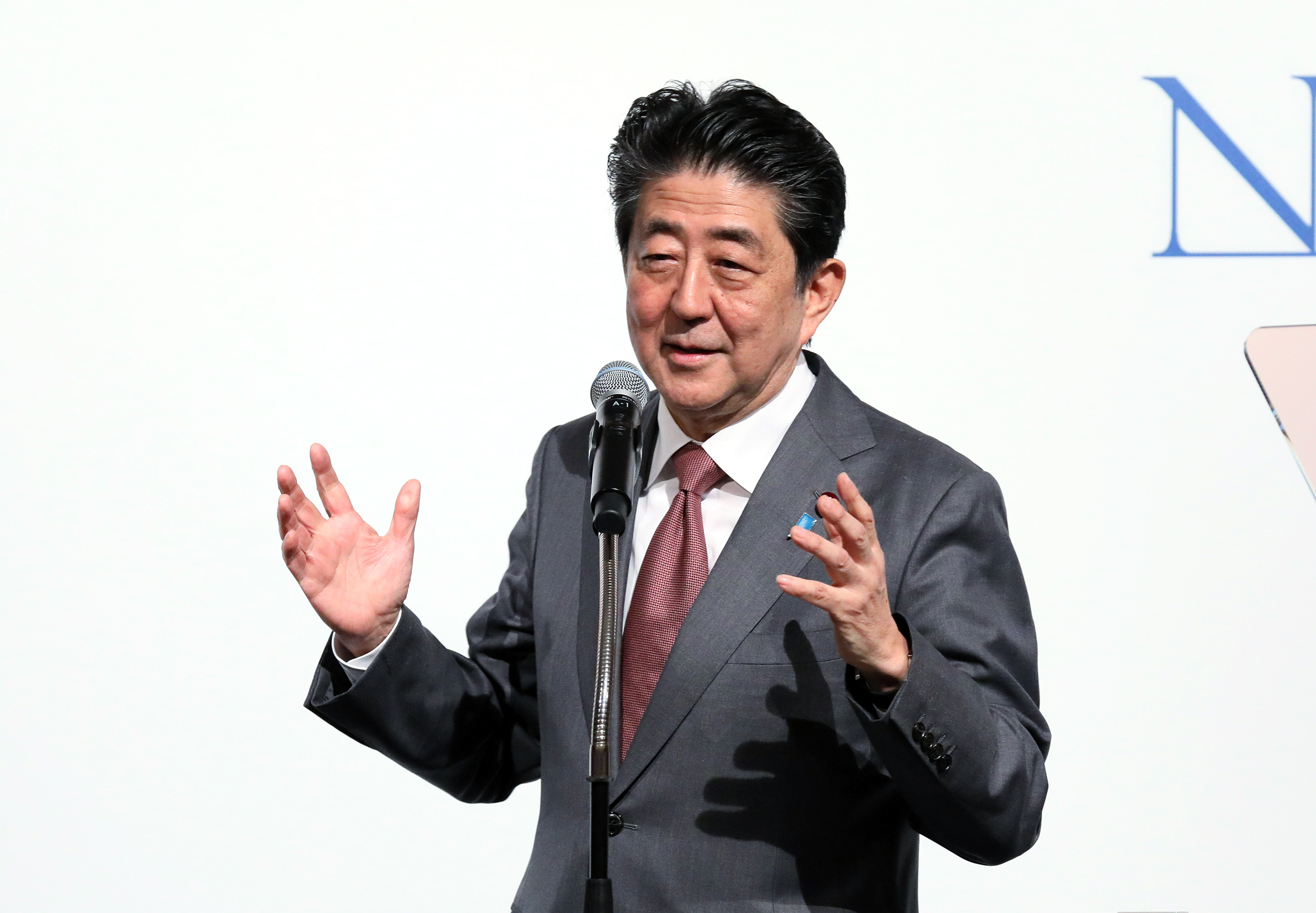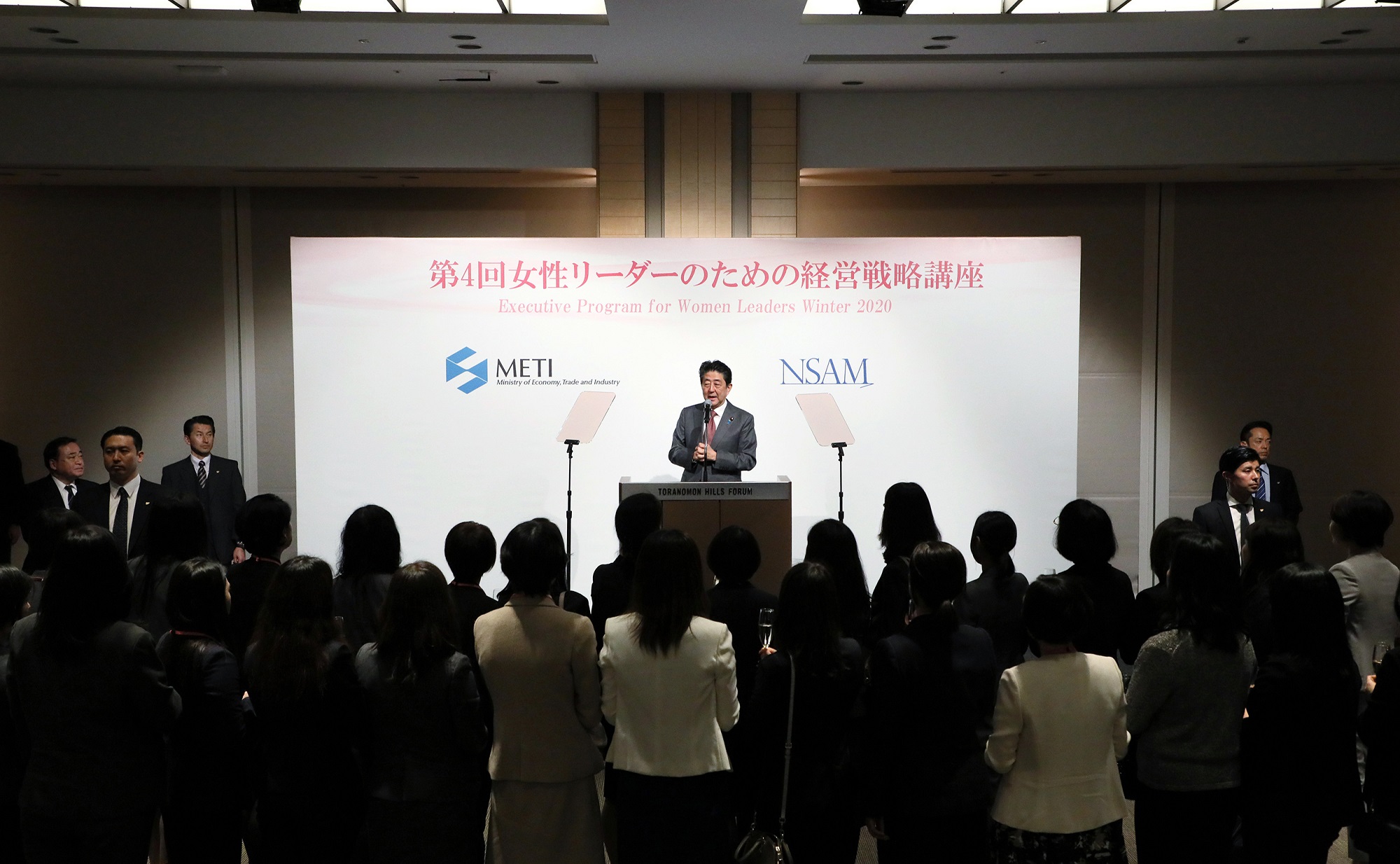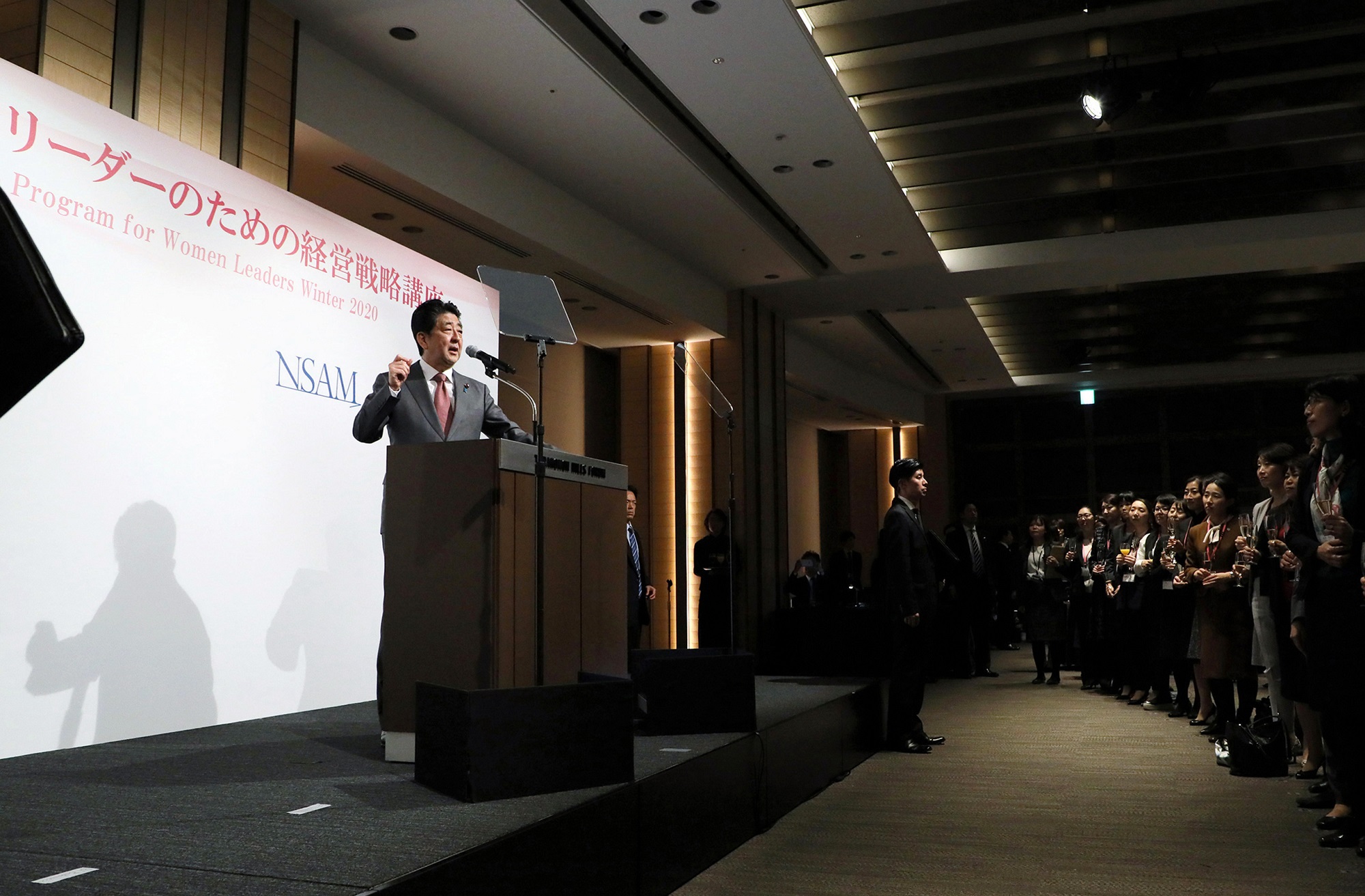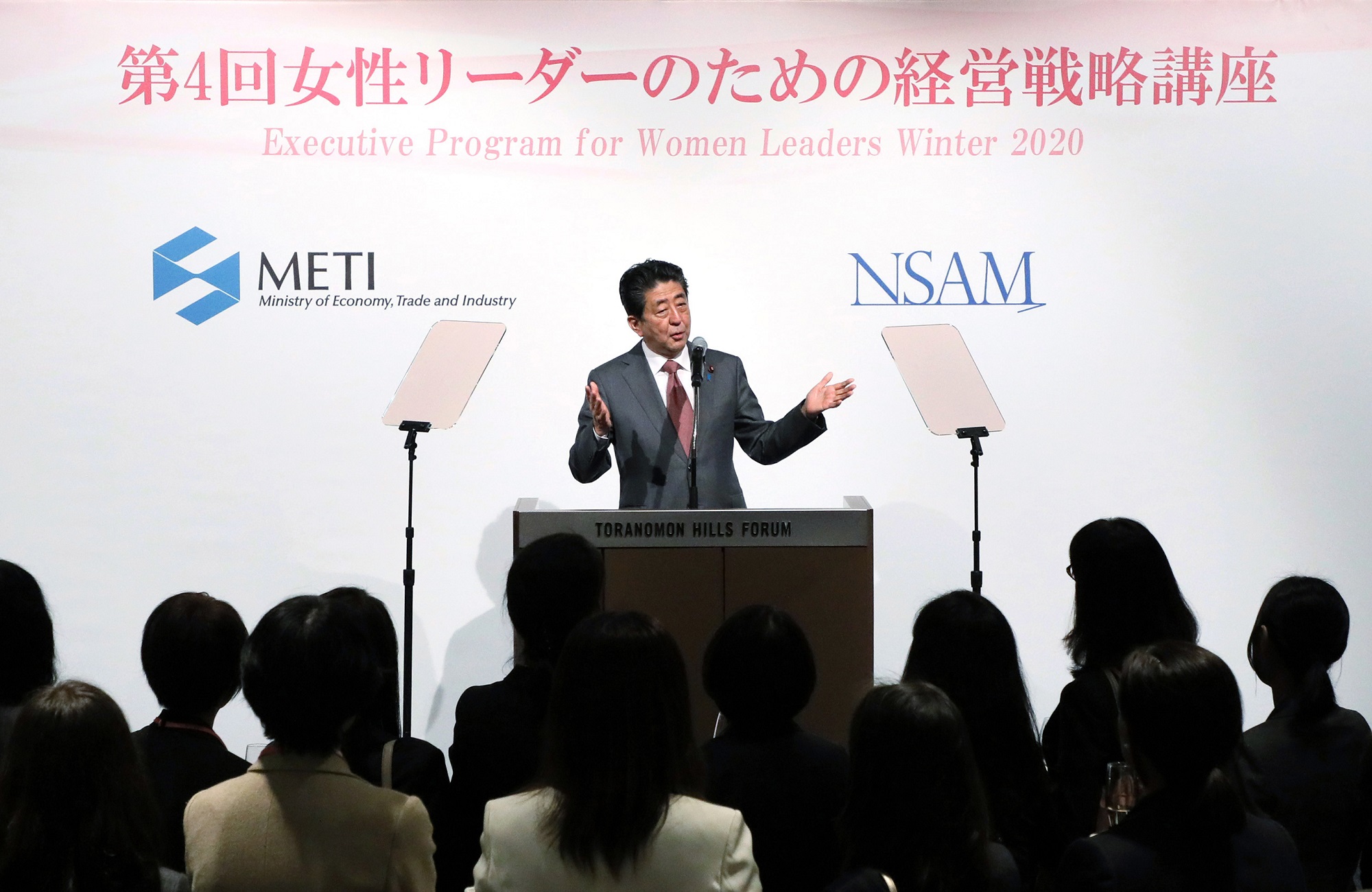Home > News > The Prime Minister in Action > January 2020 > Reception for the Executive Program for Women Leaders
The Prime Minister in Action
Reception for the Executive Program for Women Leaders
January 24, 2020
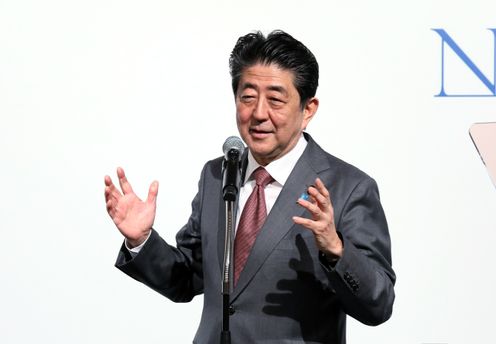
Photograph of the Prime Minister delivering an address (1)
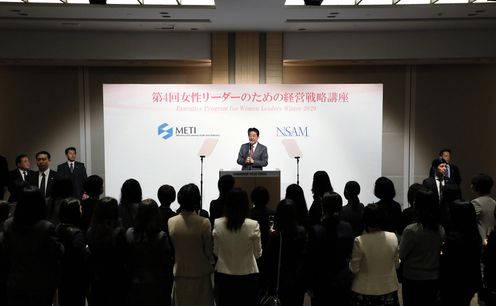
Photograph of the Prime Minister delivering an address (2)
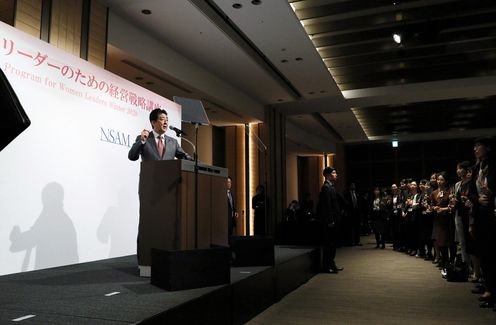
Photograph of the Prime Minister delivering an address (3)
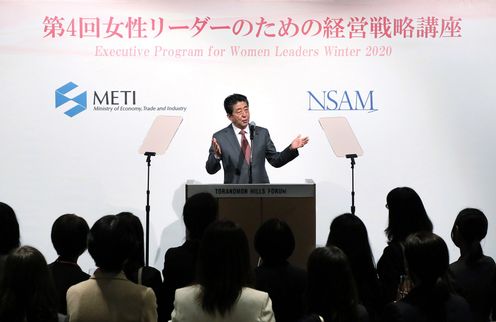
Photograph of the Prime Minister delivering an address (4)
[Provisional Translation]
On January 24, 2020, the Prime Minister attended the reception for the Executive Program for Women Leaders Winter 2020 held in Tokyo.
The Prime Minister said in his address,
“I rushed here from the Diet after a plenary session of the House of Councillors finished a moment ago in order to meet all of you, who have just finished your one-week program.
My special advisors and executive secretaries have advised me not to mention about how the plenary session of the House of Councillors went as the press are seated in the back today. Last year, I mentioned a little bit about that, prompting a range of reactions. So, I want to try to be more careful with my speech this time.
The Executive Program for Women Leaders has marked its fourth year. I was told that 72 women attended this time, the largest number ever. After all, as the Japanese proverb says, continuity itself is power. Every year, the number of women who studied management from world-leading professors has increased. That is excellent. The key pillar of Abenomics is the active participation of women. The number of women who have a job has increased by more than 2.8 million over six years and the female employment rate in Japan exceeds those of the United States, for all age groups from 25 and above.
Let me go off script for a while. Take pensions as an example. Last year, we conducted the financial verification of the pension system. Before we did this, many people said that the income replacement ratio had probably worsened. As the announcement of the results was to take place after the election, some said that I was pushing back the announcement because the results would not be favorable to the election campaign, and were urging me to announce it ahead of the election. Since the verification simply conducted calculations in a straightforward manner, we could not change the schedule because of such comments and announced the result after the election. The reason some thought the replacement ratio would have worsened was because the number of people who contribute to the pension system was expected to decrease while the number who are supported by the system would increase, due to the increase in the average lifespan and the shrinking working-age population. While they presumed that the replacement ratio would get worse, in reality, the replacement ratio has improved. The reason for that is the 5-million-person increase in the number of people enrolled in the pension and welfare pension systems, despite a decrease in the working-age population by 4.5 million people. As a result, even though a macroeconomic slide was beginning, the income replacement ratio was estimated to increase, with pension funds increasing by 0.1% last year, and by 0.2% this year. Speaking honestly, I would have welcomed such numbers being announced prior to the election; I prevented such political speculations from interfering with the announcement. I do wish that people would praise us for such determination.
Returning to the topic at hand, as shown in these numbers, many women are entering the workforce. Meanwhile, the share of women in executive positions still has a way to go compared to Europe and the United States. The Act on the Promotion of Female Participation and Advancement in the Workplace, which we amended last year, will triple the number of businesses expected to set action plans towards increasing the number of women in managerial positions.
Nowadays, people have a more diversified set of expectations towards companies; there is a rising movement to rethink the old notion of their role to maximize shareholders’ benefits. The Sustainable Development Goals (SDGs) and the Environmental, Social and Governance (ESG) concept are widely supported around the globe and what was once thought as conventional wisdom of business management is no longer conventional. Japan, in particular, is facing the challenges of a declining birthrate and aging society. Therefore, each one of us needs to improve productivity and respond to various needs such as those related to the environment, safety, and amenities, making full use of his or her own perspective.
There is no reason to justify that men should occupy the positions of business leaders as they have; of course, the same applies to the politicians. Executive Vice President of Nomura Securities TORIUMI Chie, who delivered a special lecture at the second program, said that the sense of urgency that they could no longer afford to follow the past practices had led to the promotion of female workers. She set her teeth to speak up and change things that she thought were not right, departing from the old way of thinking, she said.
This year, for the first time in 56 years, the Olympic and Paralympic Games will return to Tokyo. I suppose that none of you were born yet when the women’s volleyball team, dubbed ‘the witches of the Orient,’ won all their matches in the last Tokyo Olympics and received a gold medal. I was just a sweet little 10-year-old boy then, but I can recall that event vividly even now. At that time, the proportion of women among all athletes on the Japan team was just 13%. There were few sports that women competed in to begin with. Women’s volleyball was newly added at the Tokyo Olympic Games, thanks to the cooperation between Japan and the then Soviet Union. As a result, Japan won the gold medal, and the Soviet Union won the silver; that was a good story. This time, nearly half of the Japan team are women, and we are expecting them to claim many medals. As a matter of fact, in the nine Olympic Games that have been held since the turn of the 21st century, Japanese women have actually won more gold medals than men. When it comes to seizing the opportunity, women do better than men in Japan’s case. More women will play a significant role as a pillar and they will change their companies and society as they change themselves. I intend to exert every effort to create an environment and develop policy measures to allow women like you to unleash their full potential.
We can change the future; it all depends on what you do, and what we do. Let us join together and create a Japan that shines at the center of the world, with women playing bigger roles. Let us work together.
In closing, I would like to express my tremendous and sincere thanks to Professor Badaracco, Professor Moss, and Professor Takeuchi of the Harvard Business School for their outstanding lectures. I would like to conclude my address by expressing my heartfelt gratitude to all three professors. Thank you.”

